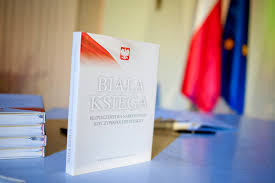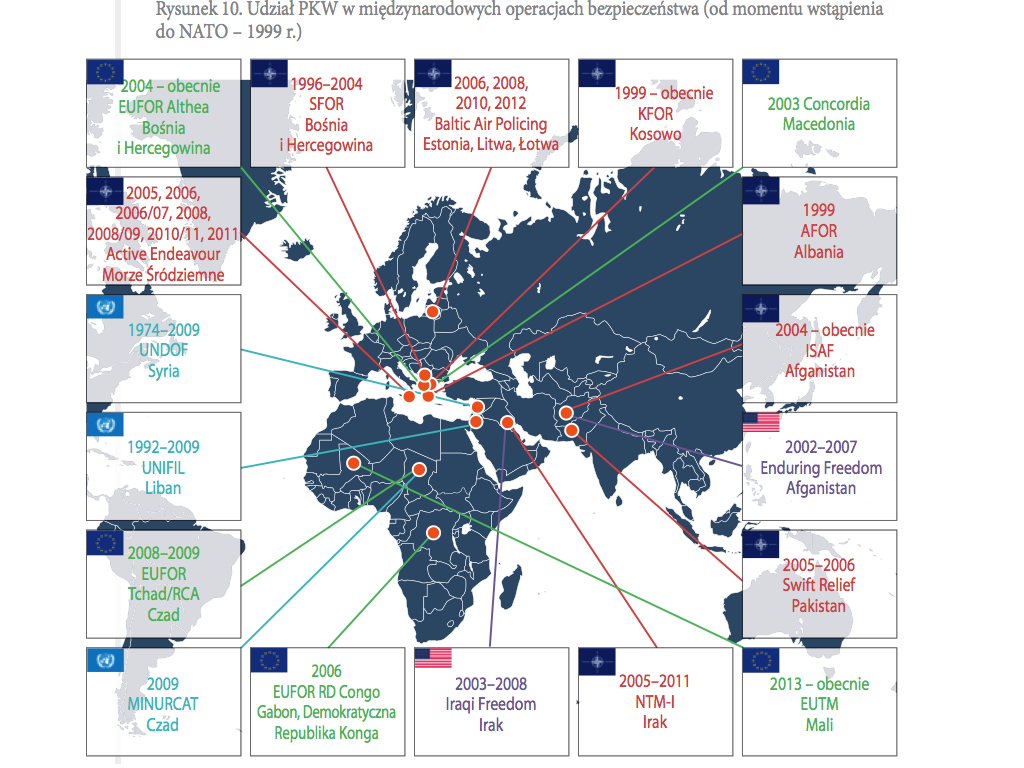This article is a part of The Hunt for Strategic September, a week of analysis on the relevance of strategic guidance to today’s maritime strategy(ies). As part of the week we have encouraged our friendly international contributors to provide some perspective on their national and alliance strategic guidance issues.
 The publication earlier this year of Poland’s White Book of Strategic National Security provides a good opportunity to comment from the perspective of a “consumer” rather than expert in the field. In the simplest view, the White Book should identify threats to national security, offer guidance to develop countermeasures, and provide Parliament with arguments helpful in making funding decisions. In specific, the Polish case addresses issues of balance between home defense and expeditionary capabilities, independent versus international or allied defense, and how to guarantee continuity of process when confronted by state budget corrections or changes in political direction. Some conclusions of the White Book are related to its own administration which aims at improving its efficiency. The timespan is until 2022 in order to synchronize it with other NATO planning documents. It is also harmonized with the most important strategic guidance documents of NATO and European Community. Last but not least, it acknowledges a need to gain broad public support for national security related problems, including defense. Therefore, more than 250 original, short booklets, answering most “why’s” were also published.
The publication earlier this year of Poland’s White Book of Strategic National Security provides a good opportunity to comment from the perspective of a “consumer” rather than expert in the field. In the simplest view, the White Book should identify threats to national security, offer guidance to develop countermeasures, and provide Parliament with arguments helpful in making funding decisions. In specific, the Polish case addresses issues of balance between home defense and expeditionary capabilities, independent versus international or allied defense, and how to guarantee continuity of process when confronted by state budget corrections or changes in political direction. Some conclusions of the White Book are related to its own administration which aims at improving its efficiency. The timespan is until 2022 in order to synchronize it with other NATO planning documents. It is also harmonized with the most important strategic guidance documents of NATO and European Community. Last but not least, it acknowledges a need to gain broad public support for national security related problems, including defense. Therefore, more than 250 original, short booklets, answering most “why’s” were also published.
With the publication of the first-ever Polish White Book, the result of an extensive series of reviews, it would be correct to ask why bother at all? It is not only a “defense review”, as previous White Papers entailed, it also links defense to other pillars of security such as social and economic factors. The review is an attempt to create an integrated approach to security. Integration enjoys the advantage of efficiency but has some drawbacks. Its complexity is good for an analyst or scholar to study (aside the fact that most of it is confidential), but it is not an easy read for ordinary citizens, the ones expected to support it. A famous question posed by Samuel Huntington is back: “What function do you perform which obligates society to assume responsibility for your maintenance?” Exposed to major changes in the security environment, or even simply budget modifications, more than 30 detailed and interrelated documents would probably need updating, leading to cascading inconsistency between them. Therefore this process needs to be reviewed on regular basis and communicated in a simple way. President Bronislaw Komorowski, who held in the past the position of Minister of Defense and is familiar with this realm decided to build political consensus and public support for the strategy around something hardly disputable: the Constitution, which says:
“The Republic of Poland shall safeguard the independence and integrity of its territory and ensure the freedoms and rights of persons and citizens, the security of the citizens, safeguard the national heritage, and shall ensure the protection of the natural environment pursuant to the principles of sustainable development.”
This is a rather strong tool, as any nominal “national interest” has to have clear reference to the above phrase. Poland is aware that the “security of Europe is determined essentially by four factors: NATO, the European Community, the U.S. strategic presence, and the relationship with Russia,” [translation by the author] but all of these factors are not fixed pillars, but rather subject to dynamic changes. Faced with an uncertain future, the best tool available, however imperfect, is to make linear extrapolation of known reality. From this principle stems strategic priorities:
1. Maintain determination and readiness to act in a full spectrum of domains, with special attention for preserving capabilities for activities that are potentially difficult to achieve Allied consensus. Gen. Koziej, Chief of National Security Bureau (Biuro Bezpieczenstwa Narodowego – BBN) often uses term ‘non-territorial threats,” by which he means hostile actions not aimed at seizing Polish territory. This is justification for the “anti-surprise” capabilities-development Poland needs to prevent any aggressor from using “fait accompli” tactics. Although the White Book doesn’t say much about force structure, it shows three directions for modernization of Armed Forces:
Air and Missile Defense
Army mobility with priority on helicopter acquisition
Integrated C4ISR
In terms of hardware, the government decided to invest in weapon systems offering some degree of conventional deterrence. Poland seeks a possibility to purchase the Joint Air-to-Surface Standoff Missile (JASSM) from the U.S. for its F-16 fighters; new conventional submarines are expected to possess the ability to fire land-attack missiles; and a Polish equivalent of the Multiple Launch Rocket System (MLRS) called Homar (“Lobster”), with an expected range between 70-350 km, will be developed in cooperation with Lockheed Martin based on newly signed contract with domestic ammunition producer Mesko. Stable acquisition planning is based on legislation obliging the Ministry of Defense to use a ceiling 1.95% of GDP in budgeting process. It seems to be a good compromise between the necessities of long-term planning and current budget debates.
2. Reassert international security oriented communities and alliances based on common interests and values including first of all NATO, EU Common Security and Defense Policy, and strategic alliances (including the US). Interviewed recently about the conflict in Syria, Gen. Koziej made an interesting remark that if Turkey as a NATO member would be threatened, Polish troops would have been involved. It is understood that collective defense is a two-way exchange. If one wants to benefit from that he needs to commit itself as well.
3. Support and participate selectively in operations with clear international mandates. Participation in military interventions dramatically changed the army’s readiness but consumed part of the resources needed for modernization. A proposed formula seeks to balance both necessities. Proportionally to its capabilities however, Poland is quite active in this arena. This picture shows participation in such operations starting from joining NATO in 1999:
Looking at above priorities it is maybe worth noting that in the first place there is an attitude – a willingness to act followed by diplomacy. Military force is important, but it is only a tool that must be in the hands of determined people. Clear strategy is among the most potent weapons a nation can have, so the effort to pass through a sometimes painful process is worth the reward. Yet what becomes more and more necessary is to involve broader audiences in strategic discussions and to avoid a situation in which strategy remains in a social, and consequently political vacuum.
Przemek Krajewski alias Viribus Unitis is a blogger In Poland. His area of interest is the context, purpose, and structure of navies – and promoting discussion on these subjects in his country.

